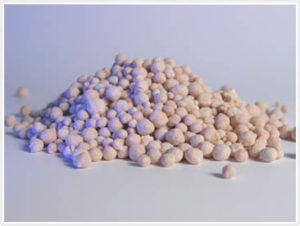 NPK (NH 4 H 2 PO 4 + NH 4 NO 3 + KCL) is a universal complex mineral nitrogen-phosphorus-potassium fertilizer with high and different ratios of nutrients. It represents a grain of light pink color. It does not cake, 100% friability, not hygroscopic. All salts that are part of NPK are soluble in water. High concentration of nutrients composes at least 40% (total nitrogen, phosphorus, potassium), can be reduced significantly (in comparison with simple fertilizers) expenses on transportation, storage and soil application.
NPK (NH 4 H 2 PO 4 + NH 4 NO 3 + KCL) is a universal complex mineral nitrogen-phosphorus-potassium fertilizer with high and different ratios of nutrients. It represents a grain of light pink color. It does not cake, 100% friability, not hygroscopic. All salts that are part of NPK are soluble in water. High concentration of nutrients composes at least 40% (total nitrogen, phosphorus, potassium), can be reduced significantly (in comparison with simple fertilizers) expenses on transportation, storage and soil application.
NPK consists of ammonium nitrate, ammophos, diammofosa, ammonium chloride, ammonium sulfate and potassium nitrate, obtained in a single technological process in the interaction of ammonia, nitric and phosphoric acids, with the addition of potassium chloride and potassium sulfate. NPK available only in granular form and has good mechanical properties, suitable for mechanized into the soil.
Application. NPK 16:16:16 is made as the primary and pre-sowing fertilizer on all types of soils for all crops. NPK is most effective on chernozem and gray soils under irrigation. At the basic making on the chernozem and soils heavy with granulometric composition of the non-chernozem zone, NPK is expedient to bring since autumn under-winter plowing, and the soils of light granulometric composition – in spring.
NPK is applied to all cultures. At the main fertilizer on chernozem and heavy clay soils of the non-chernozem zone, NPK should be made since autumn under-winter plowing, but on light soils in spring. NPK is non-toxic and non-explosive. It is transported by all surface transport modes.
